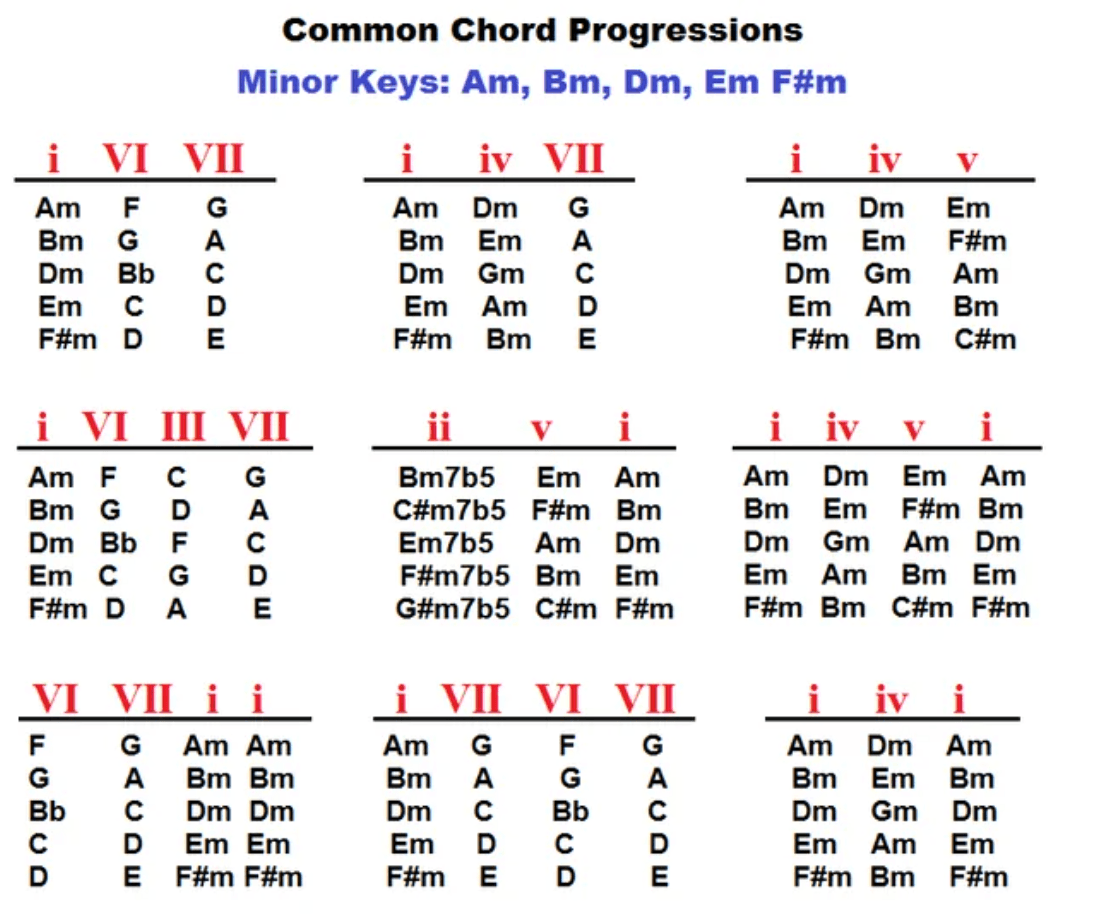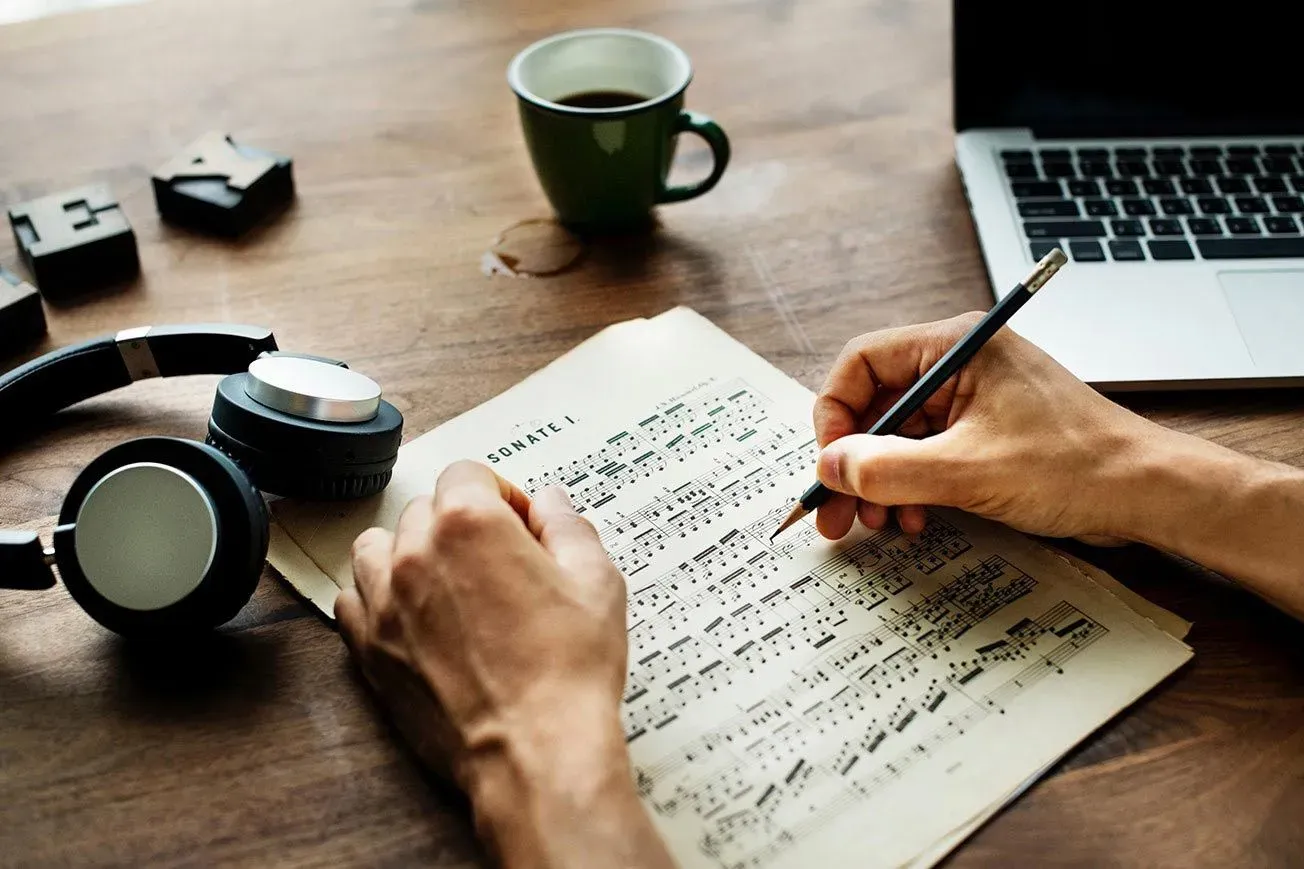Ever pondered, "What is AI for music?" Dive into this harmonious fusion of tech and tunes to uncover the answer.
As AI intersects with melodies, beats, and chords, a symphonic relationship unfolds. Ready to tune in?
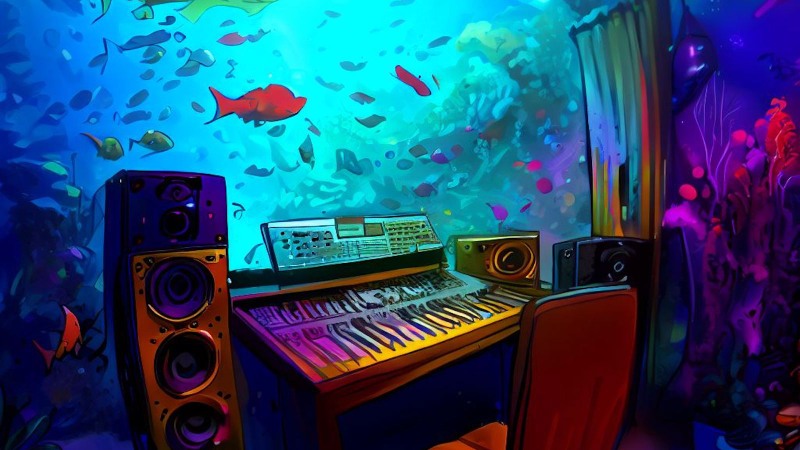
Hitting the Right Note: AI in Music Defined
Music and technology have shared a dance floor for decades. But recently, a new dancer has entered the scene: the AI music tool.
While it may sound futuristic, its role in today's audio industry is undeniable.
- AI Music Generators: At their core, these are algorithms that craft entire songs. They analyze vast amounts of music data to generate brand new compositions. Depending on the data they’re fed, they can produce anything from a melancholic ballad to an upbeat dance track.
- AI Melody Generators: Melody is the heart of a song, and these tools aim to get it right. Whether you're looking to craft an infectious hook or a soulful refrain, these generators produce memorable tunes that resonate.
- AI Chord Generators: Chords are the backbone of any song, providing depth and emotion. With these generators, artists receive chord progression suggestions, ensuring that the harmony complements the melody. This can be a game-changer for budding songwriters struggling with that perfect progression.
- AI Lyrics Generators: These aren't just algorithms; they're virtual lyricists. They can craft everything from heart-wrenching verses to catchy choruses. By analyzing patterns in popular songs and linguistic structures, they offer words that not only fit the music but convey emotion and storytelling.
History of AI in Music
The blend of audio production and artificial intelligence may seem like a contemporary marvel, but its inception can be traced back further than one might expect.
The history of AI and music is a full of curiosity, innovation, and the timeless quest to merge technology with artistry.
The Turing Prelude:
Alan Turing, often hailed as the father of modern computing, laid down some of the first stones on this path. While Turing's work wasn’t directly focused on music, his development of early computation paved the way for future explorations into electronic music and algorithmic composition.
1950s - 1970s: Experimental Endeavors:
The mid-20th century witnessed pioneering efforts in computer-generated music. Programs were developed to compose rudimentary tunes, pushing the boundaries of what machines could create. This era marked the beginning of computers being perceived not just as calculating devices but as potential artists.
1980s - 1990s: MIDI Magic:
The introduction of the MIDI (Musical Instrument Digital Interface) transformed the landscape. Musicians and producers now had a versatile tool that could bridge the gap between instruments and computers.
This period saw a surge in electronic music genres, heavily influenced by the capabilities of MIDI and early AI music tools.
2000s - Present: Deep Learning and Modern Marvels:
Advancements in deep learning and neural networks catalyzed the next revolution. AI systems could now learn from vast datasets, producing compositions with complexity and nuance.
Popular AI Music Tools
The music industry has seen a transformative shift with the introduction of AI music tools. While many are making waves, certain platforms stand out for their unparalleled innovation and contributions.
Here’s a closer look at some of the frontrunners.
1. Empress: The Future of Audio Production
- Production: Empress sweeps you into a vast landscape of audio production. Here, the boundaries are as vast as your imagination, enabling you to craft beats, melodies, and immersive soundscapes with precision. AI-powered production tools present an expansive array, allowing artists to venture into novel sonic domains and experiment with diverse textures.
- Mixing: These AI audio tools offer clarity, balance, and depth in music creation. Harness intelligent algorithms to refine and enhance, ensuring your tracks captivate with sonic brilliance.
- Marketing: Beyond the final mix lies the challenge of reaching the masses. Empress understands the significance of strategic marketing. Equipped with promotional tools, it aids in crafting impactful campaigns, reaching newer audiences, and fine-tuning strategies. From social media initiatives to liaising with labels, Empress ensures your sound resonates far and wide.
2. Soundful: The Democratization of Music Creation
Soundful stands as a testament to the power of AI in redefining music generation. Targeted at content creators and artists, it offers the tools to craft and monetize music effortlessly. With an intuitive design, Soundful ensures high-quality music creation without a steep learning curve.
The platform is not just about creating; it's about democratizing music distribution. Be it streaming on Spotify or licensing for film, Soundful makes it accessible.
3. Amper Music: Instantaneous Composition Made Simple
Amper Music is the embodiment of simplicity and efficiency in music AI tools. Designed predominantly for marketers, businesses, and podcast enthusiasts, Amper eliminates the intricacies of audio calibration. Its one-click functionality and vast instrument access make it a favorite.
Its cloud-based platform ensures all creations are stored safely, and its vast sample collection promises rapid music generation across genres.
4. Jukedeck: Where AI Breathes Creativity
Jukedeck offers a unique blend of neural network analysis and vast track customization. Drawing parallels with Amper's Music Composer, Jukedeck grants complete creative autonomy to its AI composers.
With adaptable pricing and licensing options, Jukedeck extends affordable access to high-quality compositions for diverse clientele.
5. MuseNet: The Symphony of AI and Instruments
MuseNet is more than a tool; it’s a symphony where AI meets a range of musical instruments. With the capability to generate compositions spanning genres and eras, from Classical to the Classic Rock, MuseNet showcases the magic of deep learning in music.
6. AIVA: Emotion-Driven Musical Compositions
AIVA brings a fresh perspective to music creation. By analyzing vast musical repositories, it identifies and applies patterns to produce new, emotionally-resonant compositions.
Whether you're a film director, game designer, or advertiser, AIVA crafts the perfect auditory backdrop tailored to your project's mood and essence.
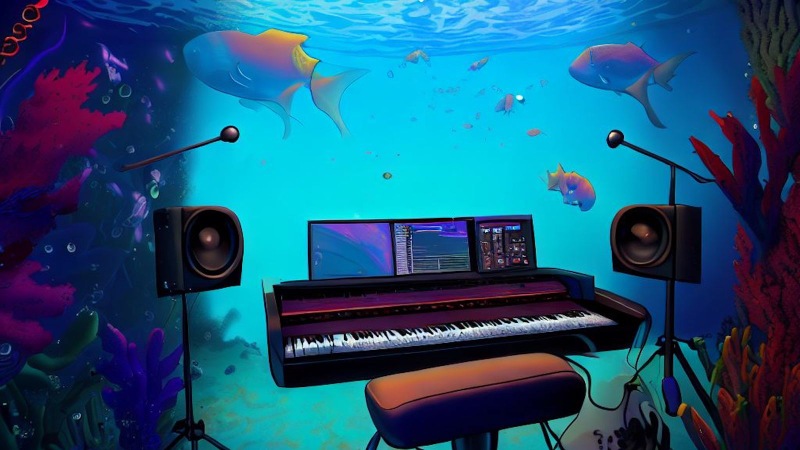
Empress Essential AI Tools
Empress stands out in the bustling AI music landscape, offering supportive tools that cater to every music creator's unique needs.
These tools are not just algorithms; they're a culmination of musical intelligence and AI sophistication.
Here's a closer look at some of Empress's state-of-the-art offerings:
1. Melody Mind
With Melody Mind, you don't just get melodies; you get tunes that resonate. Simply input your desired instrument, chords, genre, and BPM to kickstart the magic.
Example:
- Instrument: Flute
- Chords: C Major,
- Genre: Classical,
- BPM: 100
- "Get a serene, flowing melody reminiscent of pastoral landscapes."
2. Lyric Lab
Dive into a universe where words dance and sing. With Lyric Lab, all you need is a genre and tone or style, and you're set to generate lyrics that strike a chord.
Examples:
- Genre: Futuristic Sci-Fi
- Tone/Style: Ominous
- "Stars fade, galaxies decay, in this metallic realm we stay..."
3. Chord Candy
Introducing Chord Candy, an AI chord generator that understands your musical aspirations. Input your instrument, key, genre, and BPM, and let Chord Candy do the rest.
Examples:
- Instrument: Piano
- Key: D Major
- Genre: Jazz
- BPM: 90
- "A progression that feels like a cozy cafe on a rainy day."
4. Song Idea Generator
Music often thrives on raw emotion. With the Song Idea Generator, input your theme or emotion, and witness abstract feelings morph into tangible musical ideas.
Examples:
- Theme/Emotion: Euphoria — "Golden rays, endless days, in music's embrace, we always stay..."
5. Bass Brain
Bass Brain crafts bass lines that are not just sounds but the very soul of a track. Input the type of bass, chords, genre, and BPM, and let the tool do its magic.
Examples:
- Type of Bass: Slap Bass
- Chords: F Major
- Genre: Funk
- BPM: 110
- "A groovy line that gets the crowd moving."
6. Drums De Dior
No song is complete without a compelling beat. Drums De Dior understands this, allowing you to input the genre and BPM to curate beats that enhance your tracks.
Example:
- Genre: Latin
- BPM: 120
- "Rhythms that make you want to salsa!"
7. Harmonious Hitmaker
Have a song title but struggling with the tune? Harmonious Hitmaker can transform your titles into chart-toppers. Specify the emotion and genre.
Example:
- Emotion: Joy
- Genre: Pop
- "Rainbow Skies" becomes a bouncy, upbeat number filled with optimism.
8. Making Your Presence Felt: AI Marketing Tools with Empress
- AI-Powered SEO Tools: In the digital age, visibility is key. With Empress's AI-driven SEO tools, your music doesn't just reach ears but echoes across the vast expanse of the internet. By optimizing your tracks for search engines, Empress ensures that you aren't just heard, but you're discovered by enthusiasts and aficionados alike.
- AI-Crafted YouTube Descriptions: Every masterpiece deserves a grand introduction. Realizing this, Empress crafts YouTube descriptions that do justice to your music. These aren't mere summaries but powerful narratives, ensuring every listener knows the story behind the melody.
With a suite of innovative AI tools, Empress stands out as a helpful support for modern musicians and DJs. It’s not just about creating music but crafting an experience, ensuring every beat, every note, and every track resonates with its intended audience.
Pros and Cons of using AI in Music
Music, an art form that transcends cultures, has been one of the foremost arenas to embrace technological advancements, especially AI. But, like the dynamics in a symphony, there are peaks and troughs in this alliance.
Here's a take on the pros and cons of AI's role in music.
Pros:
- Precision: In a domain where accuracy is paramount, AI shines brilliantly. Every note is hit with precision, every chord strikes true, and every beat resonates perfectly, ensuring a seamless musical experience.
- Speed: Time is of the essence in today's fast-paced world. AI fast-tracks the music-making process, eliminating tedious, repetitive tasks. This allows musicians to focus on the more nuanced aspects of their craft.
- Consistency: AI ensures a consistent output every time. The algorithms ensure that the quality remains uniform, giving a consistent listening experience.
- Data-Driven Insights: AI can analyze vast amounts of data to predict what kind of music might resonate with audiences. This can be invaluable for musicians looking to tap into current musical trends.
- Infinite Experimentation: With AI, the possibilities are limitless. Musicians can experiment with countless styles, instruments, and harmonies at the click of a button.
Cons:
- Lack of Originality: As advanced as AI may be, it operates on algorithms and data. There's a tangible risk that the music it produces might lack the soul, emotion, or originality that comes from human intuition and experience. This can result in tracks that sound eerily similar.
- Over-dependency: Relying too heavily on AI might stifle genuine creativity. Artists might find themselves in a creative rut, leaning on AI for every minor aspect of music production.
- Emotional Disconnect: Music is often a reflection of human emotions, experiences, and stories. An AI might miss the subtleties and nuances that give a piece its depth and emotion.
- Learning Curve: While AI tools are designed to be user-friendly, there's still a learning curve involved. Musicians might need to invest time and resources to master these tools effectively.
- Economic Implications: As AI becomes more integrated into the music industry, there's a potential threat to jobs, especially those that involve repetitive tasks.
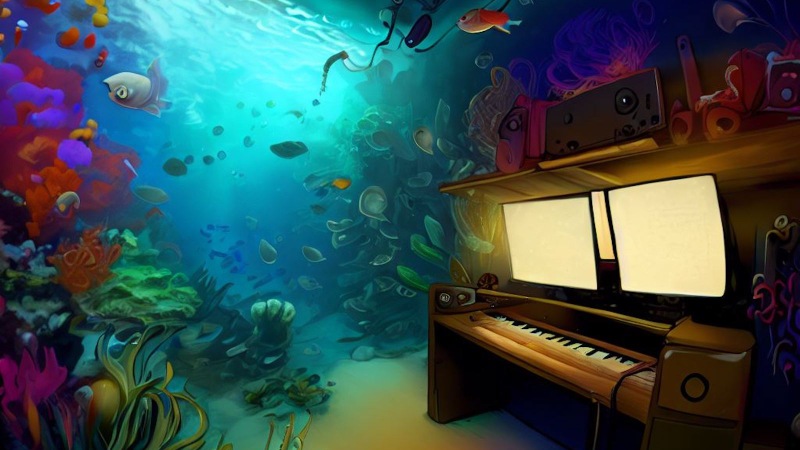
Ready to craft your next big hit?
With a plethora of tools and features, Empress stands out as a must-try for every musician. Looking to elevate your audio production? Dive into the world of Empress and let AI assist you in your music creation journey!
FAQs: AI in Music
Q1: How does an AI music tool like Empress aid in songwriting?
Empress offers AI-generated chords, melodies, and lyrics to assist in the creative process.
Q2: Is AI replacing human touch in music?
No, AI tools like Empress are designed to enhance the musician's capabilities, not replace them.
Q3: Can AI understand the emotion behind music?
While AI can analyze patterns and trends, the depth of human emotion in music is irreplaceable.
Q4: Are AI-generated songs copyrighted?
It varies. However, with Empress, musicians retain rights to their compositions.
Q5: Is AI in music only for professionals?
No, tools most AI music tools cater to both seasoned professionals and amateur enthusiasts.
Follow the future of music with Empress. Check out our blog to learn how you can effectively use these AI music tools.
